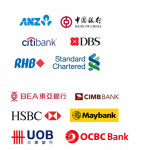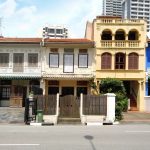Moderation in Asian Outbound Real Estate Investment as Investors from Mainland China Cool Activity
For the second consecutive year, Singapore topped Asian outbound real estate investment in 2019 at US$15 billion, albeit reflecting a 33% decline y-o-y from the US$22 billion registered in 2018. Meanwhile, Asian outbound commercial real estate investment fell 17% y-o-y to US$45 billion in 2019, said the Research Report by CBRE. The perpetuation of capital controls in Mainland China was the primary reason for the moderation in overall investment activity across the region.
Michael Tay, CBRE‘s Head of Capital Markets, Singapore said, “For Singapore, the 33% y-o-y decline in investment volume was due to the lack of large portfolio transactions recorded in 2019. This is compared to 2018, during which Mapletree Investments acquired two overseas logistics portfolio that amounted to US$4.2 billion. While office assets have been typically favored by Singapore-based investors, it is observed that in 2019, there had been stronger interest among a select number of Singapore investors shifting to look for income-generating assets in alternative sectors such as student housing.”
Top 3 asset types favored by Singapore-based investors for Asian Outbound Real Estate Investment (2019 vs 2018)
Table of Contents
| No. | 2019 | 2018 |
| 1 | Office (US$9 billion) | Industrial and Logistics (US$8 billion) |
| 2 | Industrial and Logistics (US$1.4 billion) | Office (US$7 billion) |
| 3 | Residential including student housing and multi-family (US$1.3 billion) | Mixed-use projects (US$4 billion) |
Source: CBRE Research
In 2019, Singapore Press Holdings acquired a student housing portfolio in the UK for US$579 million, while Mapletree Investments purchased two purpose-built student housing buildings in Coventry, UK for US$117 million.

Overall Asian Outbound Real Estate Investment momentum in 2019 was also propelled by Korean investors, whose full-year investment volume grew by 66% to US$12.5 billion. Nearly 70% of the total Korean capital was invested in European markets.
Tom Moffat, CBRE’s Head of Capital Markets, Asia, noted, “As Chinese investors decelerate their outbound investment activity, we’ve seen Korean investors counteract this and continue to dominate the offshore investment landscape, expressing a strong interest in office, hotel and logistics sector assets. Low financing costs and the hedging premium between the Won and Euro continue to motivate investors from Korea.”
Traditionally, Japanese institutional investors preferred to invest into global real estate via indirect vehicles. In 2020, Japanese investors, stepped up their direct purchasing activity by 40% y-o-y to US$3 billion – with a strong focus on U.S. market.
Portfolio diversification stimulated investors from Korea, Hong Kong and Singapore to inject significant capital into Europe, of which US$4.9 billion in deals was recorded in Paris alone. Investors from Asia also led a pronounced shift toward other European cities, including Dublin, Milan, Prague, Warsaw. Dr. Henry Chin, Head of Research, APAC/EMEA, says, “Investors from Hong Kong and Singapore are expected to continue paying close attention to European markets throughout 2020. The easing of geopolitical uncertainties post-Brexit are also expected to reignite investors’ interest in London in 2020.”
Outside of Europe, commercial real estate investors in Asia Pacific showed a strong interest in Beijing, Shanghai and Sydney. While the U.S. experienced a downturn in investment volume from Asia Pacific, investors from Korea showed investment appetite for hotel assets in the country, demonstrated by Aju Group’s acquisition of two Hyatt-branded hotels in midtown Manhattan and Lotte’s acquisition of the hotel portion of a downtown Seattle skyscraper. Dr. Chin adds, “While concerns about the recent coronavirus outbreak will dim investment activity in the short-term, we expect investors to monitor developments closely, postponing rather than exiting investments.”
Mainland Chinese investors’ capital outlay slowed for the second consecutive year, but some investors from this market have shown a proclivity for alternative assets, such as senior housing, a notable transaction being Cindat Capital’s acquisition of a UK-based portfolio in H2 2019, adding to its 2017 acquisition of a senior housing portfolio in U.S.. Asset disposals by investors from Mainland China continued in 2019; however, the rate of disposal was lower than the amount recorded in 2018.
“In 2020, we expect commercial real estate investors in Asia Pacific to continue seeking higher returns and portfolio diversification opportunities outside of their domestic markets. As the upward market cycle reaches maturity, it is projected that investors in the region will turn to assets with stable income streams,” Dr. Chin concludes.
Mr Paul Ho, chief mortgage officer at iCompareLoan, said, “In the previous quarters, Singapore-based investors have been more active in China, but the Covid-19 situation there may have blunted some of this enthusiasm.”
He added, “Investors from Singapore have been active in the global real estate market in the years 2017 and 2018, but the US-China trade war and the general economic uncertainties have made them look at Asian Outbound Real Estate Investment market.”
CBRE’s earlier research said that there is continued strong demand from Singapore-based buyers seeking opportunities in mature economies, particularly cities in the US and Western Europe. A select group of buyers also looked beyond the European gateway cities to Ireland and Poland.
Top five destinations favored by Singapore-based investors (H1 2019 vs H1 2018)
| No | H1 2019 | H1 20018 |
| 1 | China | United States |
| 2 | Korea | Germany |
| 3 | Japan | United Kingdom |
| 4 | United States | China |
| 5 | United Kingdom | Japan |
Source: CBRE Research
For Singapore-based investors, acquisition strategies focused primarily on structural opportunities such as logistics properties as well as defensive assets such as offices. There are also buyers who are adding multi-family assets to their portfolios. An emerging trend among Singapore-based investors is the pursuit of higher yields and alternative investments, including student accommodation and data centers.
Mr Ho said, “the Asian Outbound Real Estate Investment is bound to remain resilient despite the economic threats because with excess cash and fluidity in the region, investors will continue to seek portfolio diversification and new markets.”






